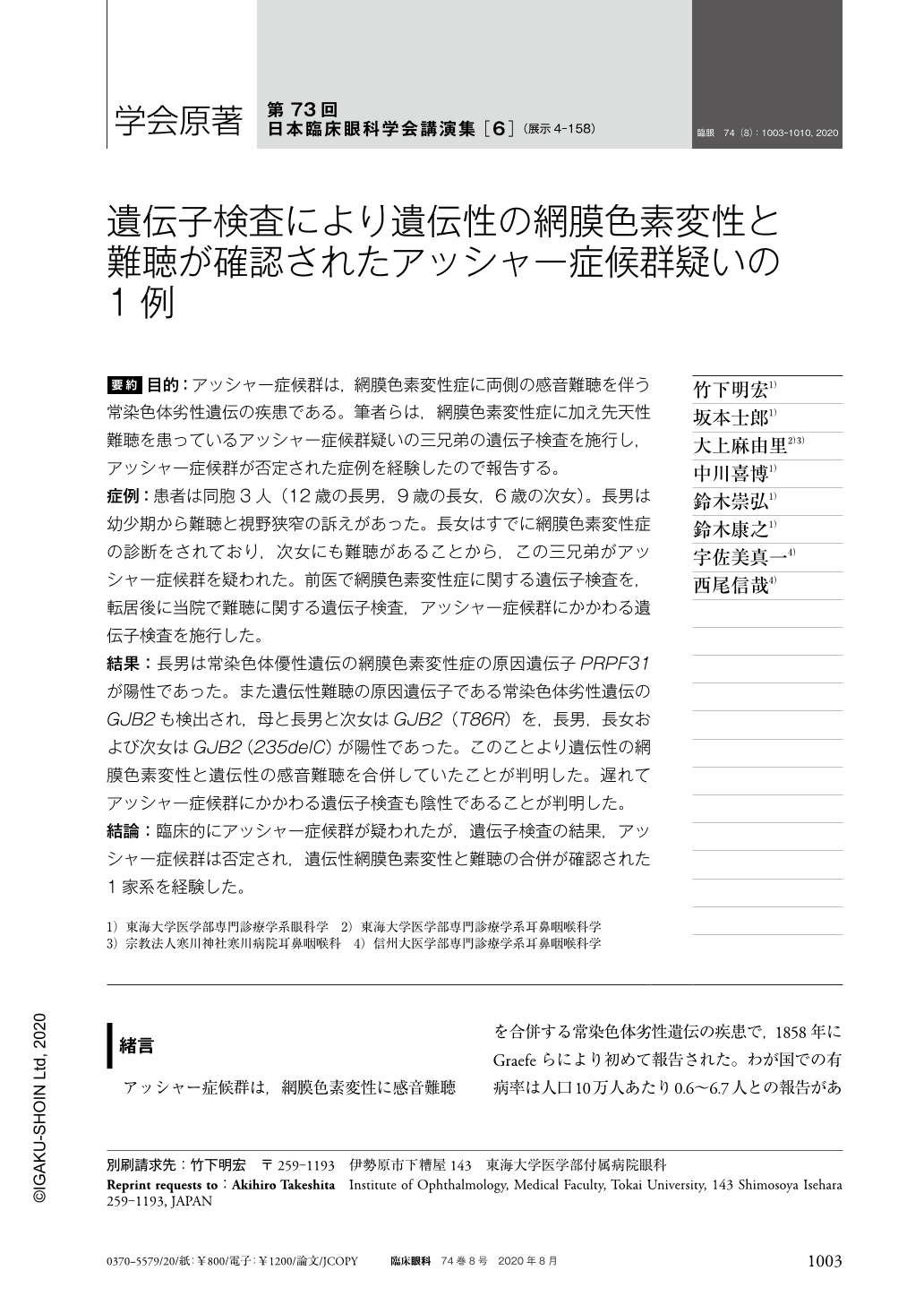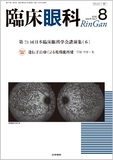Japanese
English
- 有料閲覧
- Abstract 文献概要
- 1ページ目 Look Inside
- 参考文献 Reference
要約 目的:アッシャー症候群は,網膜色素変性症に両側の感音難聴を伴う常染色体劣性遺伝の疾患である。筆者らは,網膜色素変性症に加え先天性難聴を患っているアッシャー症候群疑いの三兄弟の遺伝子検査を施行し,アッシャー症候群が否定された症例を経験したので報告する。
症例:患者は同胞3人(12歳の長男,9歳の長女,6歳の次女)。長男は幼少期から難聴と視野狭窄の訴えがあった。長女はすでに網膜色素変性症の診断をされており,次女にも難聴があることから,この三兄弟がアッシャー症候群を疑われた。前医で網膜色素変性症に関する遺伝子検査を,転居後に当院で難聴に関する遺伝子検査,アッシャー症候群にかかわる遺伝子検査を施行した。
結果:長男は常染色体優性遺伝の網膜色素変性症の原因遺伝子PRPF31が陽性であった。また遺伝性難聴の原因遺伝子である常染色体劣性遺伝のGJB2も検出され,母と長男と次女はGJB2(T86R)を,長男,長女および次女はGJB2(235delC)が陽性であった。このことより遺伝性の網膜色素変性と遺伝性の感音難聴を合併していたことが判明した。遅れてアッシャー症候群にかかわる遺伝子検査も陰性であることが判明した。
結論:臨床的にアッシャー症候群が疑われたが,遺伝子検査の結果,アッシャー症候群は否定され,遺伝性網膜色素変性と難聴の合併が確認された1家系を経験した。
Abstract Background:Usher syndrome is an autosomal recessive hereditary disease in which retinitis pigmentosa and bilaterally sensorineural deafness is combined. We report a family of three brothers who were suspected to have Usher syndrome because of retinitis pigmentosa with bilaterally sensorineural deafness. Usher syndrome was declined by performing genetic testing.
Case:Three brothers, 12 years old male, 9 years old female, 6 years old female. The eldest son had deafness and lack of vision since childhood, the second oldest sister had also been diagnosed as retinitis pigmentosa, and the youngest sister had deafness. so we suspected that all of them suffered from Usher syndrome. Since their previous doctor had performed genetics test for retinitis pigmentosa, we carried out the genetic testing for deafness and Usher syndrome.
Result:The eldest son had mutations in PRPF31, which is one of the responsible gene of retinitis pigmentosa by autosomal dominant inheritance. Additionally, we found the mutation in GJB2, the causal gene of the sensorineural deafness by autosomal recessive inheritance. Their mother, the eldest son, and the second sister had mutations in GJB2(T86R), the eldest son, the second sister, and the youngest sister had mutations in GJB2(235delC), respectively. This means that the primary diseases in this case are hereditary retinitis pigmentosa and sensorineural deafness. We have also confirmed that the responsible gene of Usher syndrome was not found in the genetic testing.
Conclusion:The case clinically suspected as Usher syndrome was found to have hereditary retinitis pigmentosa combined with hereditary sensorineural deafness, as a result of genetic testing.

Copyright © 2020, Igaku-Shoin Ltd. All rights reserved.


